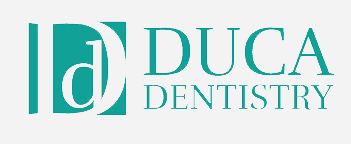Specialty Procedures
Dentures are prosthetic devices constructed to replace missing teeth, and which are supported by surrounding soft and hard tissues of the mouth. Dentures are removable and there are many different denture design possibilities, which Dr. Duca customizes precisely for each patient.
Because dentures are removable, and because of the arrival of time-tested techniques like dental implants that stabilize restorations, dentures have greatly diminished in popularity over the last decade. Most of our patients that have the anatomy and financial ability necessary for fixed restorations either supported by natural teeth or implants like crowns, bridges, or implant supported dentures, typically choose them in lieu of the old fashioned denture. Fixed restorations stay in place and do not have to be taken out at night. They feel more like natural teeth. Dentures, no matter how perfectly they are made, do move slightly when the patient chews and need to be taken out at night.
For the purposes of description, below is a summary of the two general types of removable dentures that have traditionally been available to patients.
Removable Partial Dentures
Removable partial dentures are for patients who are missing some of their teeth on a particular arch. These dentures usually have cast metal clasps that attach to adjacent natural teeth to help to hold them in place. Sometimes, recontouring of your natural eeth is necessary to assure the best fit possible. These dentures are traditionally made with pink acrylic and a chromium- eryllium-cobalt metal substructure and clasps. They can also be made of acrylic with pink clasps in some cases. Often, when possible, patients that might wear partial dentures switch to fixed bridges or implant- orne prostheses, which feels and function more like your own teeth and stay in place all the time.
Complete Dentures
Patients who are missing all of the teeth in a given arch wear complete or full dentures. For uppers, they cover the roof of the mouth to the soft palate for support and retention. Lower full dentures have the tongue to contest with and thus, do not have as much surface contact with the mucosal tissues. This fact can make lower full dentures somewhat more difficult to accept as a true tooth-replacement appliance. They are horseshoe shaped. Complete dentures are made of pink acrylic and denture teeth. It has become common to use implants placed in strategic areas of the lower arch as a support for full dentures. This offers the patients much more stability. Although the resultant appliance is still technically a denture, it feels more secure and stable during chewing and speaking due to the implants retentive enhancement.
The most effective use of this unique dental product is stabilization of a lower denture. There are approximately 50,000,000 people in the United States who are “edentulous” (literally meaning lacking teeth) who struggle daily with prosthetic devices. A majority suffer a great deal of discomfort as a result of lose or ill-fitting dentures. Many denture wearers simply withdraw from any type of social engagement as a result of being compelled to wear them. Moreover, it’s not uncommon for family members to complain about a denture wearer’s disagreeable breath as a result of food being trapped and decaying under their denture prosthesis.
Get In Touch
Call
(973)278-8181
lduca@ducadentistry.com
Address
347 Valley Road Clifton, New Jersey 07013
Hours
M 9-4 T 1-8p
W 9-4 Th 9-4
Closed Friday, Saturday and Sunday

